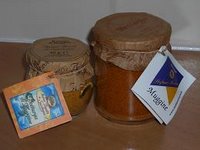Bottarga

This late summer academics were seen huddling together in the corridors of the Amsterdam University, exchanging small jars with orange coloured powdery contents. As these secretive meetings took place in the humanities department, no one thought anything of it. And rightly so, as this was all about bottarga.
Bottarga is salted, pressed, dried roe of gray mullet (muggine) or tuna fish (tonno), a mediterranean delicacy, claimed by every region as its own and given a fancy name: Sardinian caviar, Sicilian caviar, Egyptian caviar. But as foodtourist.com writes: bottarga is bottarga is bottarga. It comes vacuum-packed in a piece or grated in jars and is used in pasta sauces (spaggheti alla bottarga), as an appetizer (with lemon juice on a piece of bread) and can often replace dried anchovy.
Two jars of grated bottarga di muggine are in my cupboard now and one is half empty already. Today, as you'll have concluded by now, bottarga is not easy to come by if you don't have friends in Sardinian places. This must have been different in the seventeenth century. I quote from The Diary of Samuel Pepys, 5 June 1661:
'So home Sir William and I, and it being very hot weather I took my flageolette and played upon the leads in the garden, where Sir W. Pen came out in his shirt into his leads, and there we staid talking and singing, and drinking great drafts of claret, and eating botargo and bread and butter till 12 at night, it being moonshine; and so to bed, very near fuddled.'The glossary explains that 'botargo was chiefly used to promote drinking by causing thirst'. In the case of mr. Pepys, I get the impression he ate the salty substance with bread and butter to soften the effect of the alcohol, though with limited success. From the same glossary I learned that bottarga is also mentioned in the Sailor's Word-Book by Admiral W.H. Smyth (1867, reissued in 2005), who was of the opinion that 'the best kind comes from Tunis'.
Allow me one more digression before I give you my bottarga recipe. Samuel Pepys' drinking mate was none other than Admiral William Penn, who fought against us Dutch in the beginning of what I learned at school to be the Second English War - a war we won, but lost. See, if this sounds intriguing, The Second Anglo-Dutch War (1665-1667). International raison d'état, mercantilism and maritime strife by Gijs Rommelse (Verloren 2006), about whom I read today in NRC Handelsblad.
Sicilian rice salad
Boil 300 gr rice and let it cool. Add a royal amount of chopped flat-leaf parsley, at least 2 gloves of garlic (chopped), the juice of 1 lemon, 3 heaped spoons of grated bottarga and ample olive oil. Mix well and put in the fridge for about an hour. Goes well with char-grilled meats, but not with claret.


2 Comments:
What a lovely and lively style you have! A pleasure to read.
Hi Elisabeth,
Very nice to read your blog, Isabelle told me about it ... Very tasty written...
Wanted to tell you about "Vergeten groenten", but saw you have already the link at the right of your blog.
Have you ever attended the "Vergeten" or "Forbidden" dinners from SlowFood?
Marius and I are (slow) foodies, too.... My blogs though are only about my kids and hiking...
Susan Krieger (susan.krieger@gmail.com).
Post a Comment
<< Home